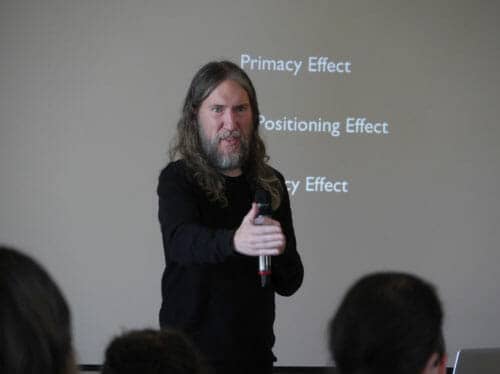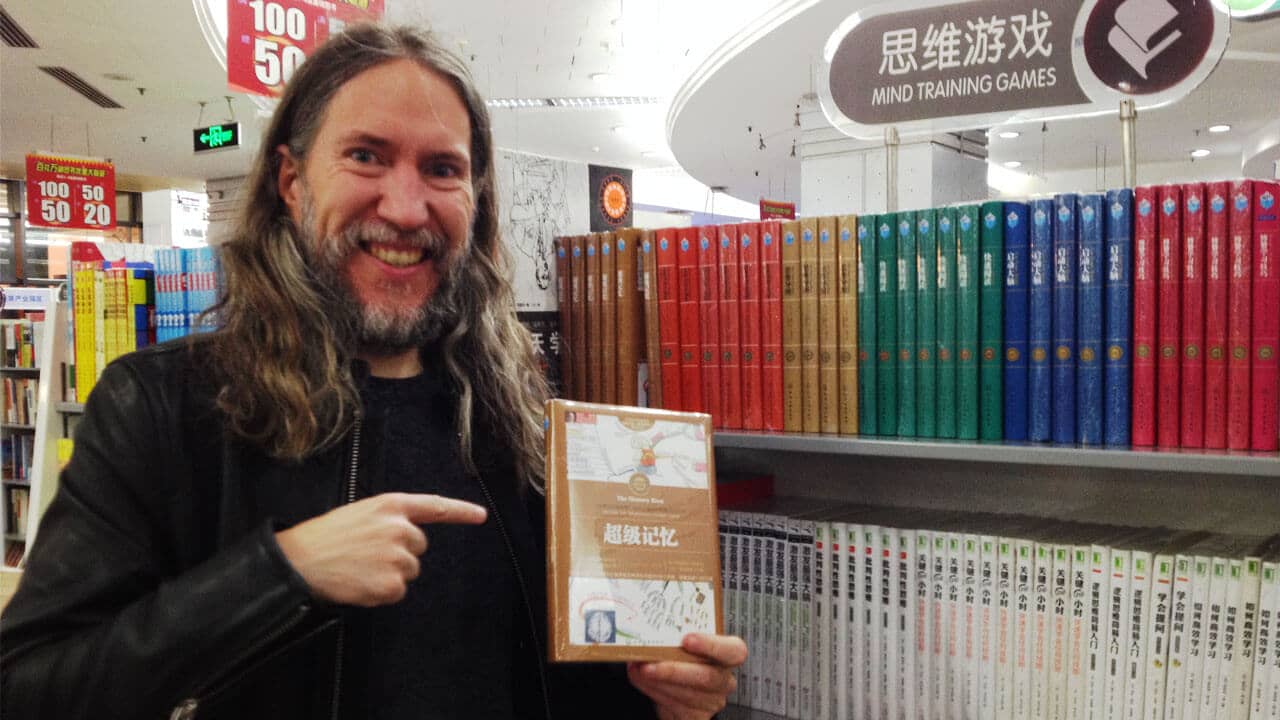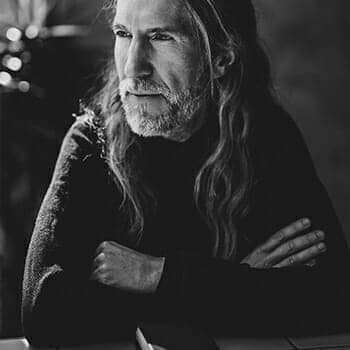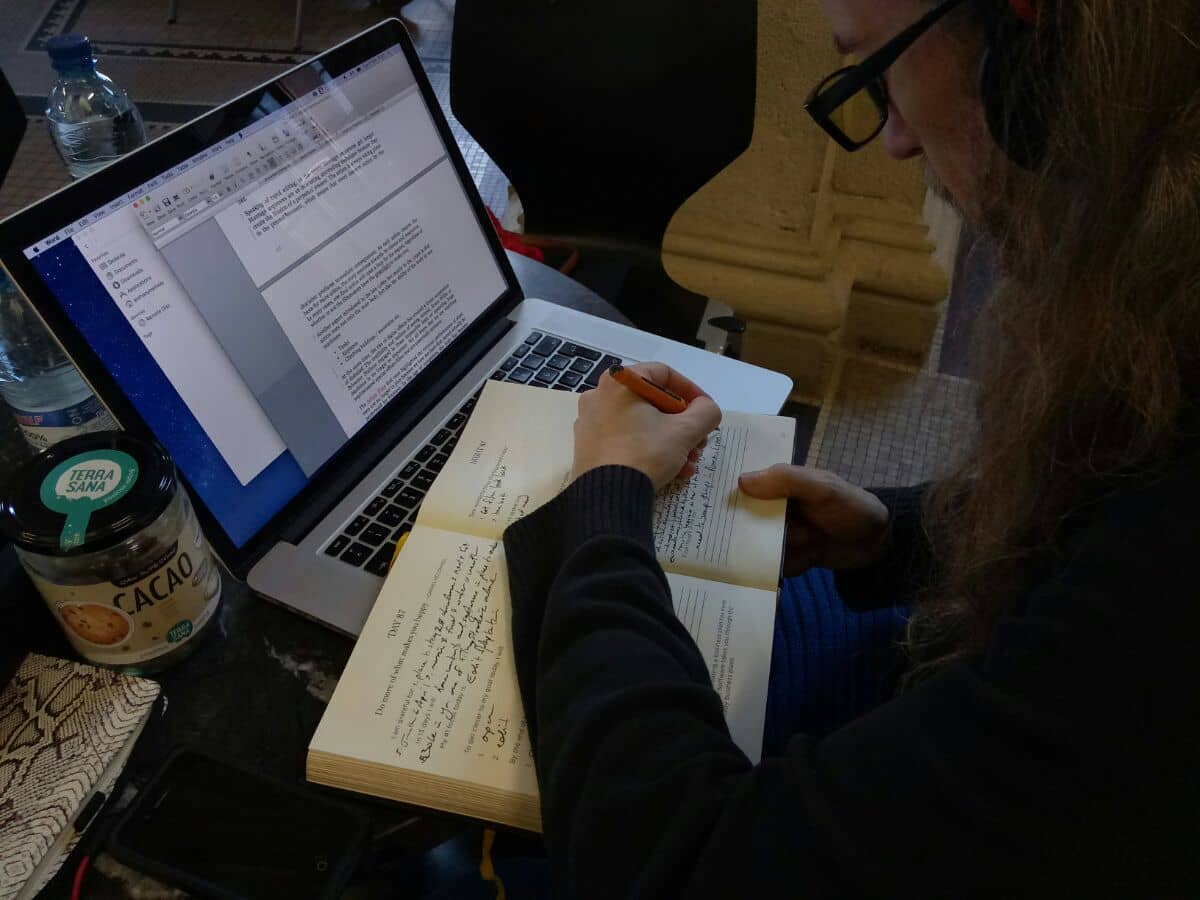Podcast: Download
Subscribe: Apple Podcasts | RSS
 Many people who want to master multiple topics wonder about the exact polymath personality traits they’ll need to nurture.
Many people who want to master multiple topics wonder about the exact polymath personality traits they’ll need to nurture.
I went through the hard work of figuring this out myself, especially while completing my PhD at York University in Toronto.
During those years, I studied a variety of polymaths to “reverse engineer” how exactly they developed so many skills without simply winding up with dust in their hands due to splitting their focus.
My research took me into many areas, ranging from self-improvement topics to philosophy and the role of friendship.
Luckily, it didn’t take me long to discover many of the traits found in most polymathic people. But there’s something else I discovered that you also need to know about.
All of these things will be covered in-depth on this page.
So if you’re interested in the traits you need to nurture so that you can become truly polymathic, this may be the most important post you ever read.
Ready?
Let’s dive in!
What Is A Polymath?
The word polymath comes to us from polymathēs in Greek. It stems from “poly” for many and “manthanein” for “to learn.” That means you can be a polymath without actually having math in your skillset.
Where did the idea that someone can master many topics come from?
Many people say that the idea of mastering several fields arose during the Renaissance and Enlightenment era. There’s certainly truth to this and it’s one reason why the term “Renaissance Man” still circulates.
Frankly, polymathic people have been around for a lot longer than that. Aristotle was a polymath, as was arguably his student, Alexander the Great.
In Ancient China, Shen Kuo mastered multiple topics during his life. Between the years 1031 and 1095 he worked successfully in everything form meteorology and metallurgy to politics and pharmacology.
According to research Michael Araki, it’s not the topics themselves that define polymathy. What matters is:
- Breadth
- Depth
- Integration
In other words, a polymath has a comprehensive understanding of multiple topics, but not in a shallow way. There must be depth, and typically this depth is demonstrated through integration. Since Araki’s terms are open to a lot of interpretation, let’s look first at the traits that must be in place and nurtured in order to fulfil these categories.
Then we’ll look at how to avoid self-delusion. There are a lot of people who claim to have breadth, depth and integration. But we need to know how to test these claims in order to avoid charlatanism.
The 3 Core Traits Of A Modern Polymath
As we go through these traits, keep in mind that none of them need to be inborn or part of your DNA. As intelligence and memory studies have shown, it’s possible to rewire the brain and teach old dogs new tricks. Yes, even those who have never had any experience in mastering a single topic area or skill, let along several.
So if you feel like you’re missing any of these traits, don’t worry. They can all be developed.
One: Curiosity You Can’t Control
Polymathic people are driven by their curiosity.
You might be thinking, how on earth am I going to get curious about boring topics when I only have a mild desire to learn more as it is?
There are several paths you can take. Some of them involve exercises that will grant you greater mental strength. Others might require you to use mind mapping or other forms of positive visualization to start rewiring your current state.
One way or the other, developing your current curiosity and nurturing it is the key.
For example, I was once told by Harry Lorayne to not tell people about memory science. He said that if you’re going to run a successful memory business, you need to avoid heavy topics that scare the “mass market” away from your Magnetic Memory Method Masterclass offers.
This advice made me curious and although I don’t think he was wrong, I made myself lean into it. Soon, I was insatiably curious about memory science.
Sure, some of my least successful YouTube videos cover the science of memory. But I’m glad that something in my character let me avoid that piece of advice. I’ve been personally rewarded many times over by what I’ve learned, even if he was probably right from a business perspective.
This issue is something all true polymaths will probably have to face at some point in their learning journey. As the old saying goes, “you can be rich or you can be right.” So far, I’ve followed the mind map I created with Tony Buzan years ago and my curiosity about memory science and the desire to have an accurate understanding about it has won.
Two: Interdisciplinary Skills With Scientific Intent
When I started my PhD in Humanities, the exact nature of the program was unclear. I entered the very first year of its existence and was in fact the first person to graduate. To this day, the exact definition is mostly left up to the individual graduate student, which has pros and cons.
Early on, I decided I would absorb all I could by taking courses in the history of science, classical languages and the history of religion. Science was my favorite of these topics, so when I started studying for my field exams, I decided I would use it as my lens for everything. As I’ve traveled the world as part of my ongoing research, I’ve continued to use a scientific foundation and this focus has rewarded me many times over.
Although I ultimately wrote my dissertation on friendship and talked a lot about how friendships appear in movies and TV shows to craft a philosophy of friendship, it was scientifically guided. I combined reader-response theory with market analysis to guide my conclusions, tempering some of my wilder philosophical questions with what the data actually said.
The best polymaths have tended to use the scientific tools available during their times. Whether it’s St. Augustine’s theory of memory or Giordano Bruno’s approach to mnemonic imagery, a huge reason that the learning of these individuals has stood the test of time is the empirical thinking they put into their writing. And that means they tested their concepts empirically during the research and reflection stages as well.
Even if I’m wrong about that, it’s important to place a premium on science in your studies in today’s world. Scientific literacy is a basic requirement if you want to be taken seriously. It’s healthy to recognize its limits too, but far too many people claim to be knowledgeable on topics when they clearly aren’t even thinking critically, let alone scientifically.
Three: Adaptability
Because humans have many memory biases and our scientific approaches don’t always pan out, we need to be able to shift. Sometimes quickly.
This is one area where having breadth, depth and integration come in. For example, artificial intelligence is a big field now. All kinds of writers are in trouble. But if they had true breadth and depth in multiple topics, they would find it much easier to integrate the skill of writing and turn it towards AI itself.
That’s just one example, something I explored myself by integrating what I know about language learning with the idea about using chatGPT to help acquire a language through laddering.
It’s clear that humans will have to become more and more adaptable over the years to come. To develop this trait, I would suggest getting a solid mix of brain exercises along with physical exercise, eating the best possible foods for memory and completing substantial learning goals.
Make no mistake: completing goals is a key to developing adaptability. If you have established a pattern of dabbling and never completing what you start, it won’t matter how broad your interests are. You’ll be lacking in depth and have nothing to integrate into the flows and intensities of whatever the future might bring.
Overcoming the “Jack of All Trades” Stigma
A while ago, someone commented on one of my videos: “You’re not a polymath.”
Truly, how does some dude on the internet who uses an anonymous screen name know this about me?
I share this criticism because anyone who starts on the road to polymathy is bound to be criticized. You might even be called a Jack of All Trades, Master of None.
You know what? The people who criticism might be right.
To ensure that they aren’t and that you truly are a polymath, you need to identify the traits important to your specific interests and nurture them.
For most of us, this will be a battle of nature vs. nurture. Personally, I’ve needed to master journaling for self-improvement and for memory in the ways discussed by memory expert, Johannes Mallow. In both cases, everything involved here boils down to:
- Crafting a vision of success worth pursuing that includes the variety of topics you want to master
- Breaking goals down into achievable milestones
- Analyzing your performance
- Optimizing how you develop your skills and knowledge over time
After you’ve got this basic protocol in place, it’s just a matter of using accelerated learning techniques properly. Let’s discuss what they are and why you need them next.
How to Be A Polymath: A Practical Guide
Once you’ve identified a worthy vision and are using a journal to track and optimize your progress, you’ll essentially need to hedge against the dangers of multitasking.
Let’s face it: You’re probably not going to master anything if you have dozens of tabs open and spend more time switching between them than actually studying.
To avoid that problem, you’ll want to:
- Keep a study and deliberate practice schedule
- Have multiple places to study worked out in advance
- Include at least one mentor in your lifelong learning journey
- Use interleaving to promote better memory and avoid topic exhaustion
- Master a variety of tools that will help you remember as much as possible
The tools I recommend and used myself during university and have used throughout my professional career include:
- The Memory Palace technique
- Optimized flashcards (a.k.a. Zettelkasten)
- The Leitner Method
- Mnemonic systems for remembering numbers like the Major System and a PAO System
- A Spaced Repetition system to avoid wasting time on rote learning at all costs
Finally, you just need to keep in mind breadth, depth and integration. To ensure that you have all of these covered, you’ll want to decide upon some benchmarks.
One tool I’ve found useful for setting up and tracking benchmarks is The Freedom Journal. I dragged one with me all over Europe on my honeymoon to make sure I got one of my projects done. In this case it was an initiative I felt some resistance around, and having every tool and protocol we’ve discussed on hand helped me finally satisfy the constant urge to work on it despite my resistances and as a result, make space in my mind for other things.
No one can tell you exactly how to measure your accomplishments. But depending on the topic areas you choose, there may be official testing bodies you want to consult. Some of my friends, like Nelson Dellis and Dave Farrow have established Guinness World Records, for example.
For myself, I’m currently drafting a book chapter I’ve had accepted for a scholarly book on memory and the senses. I also test my learning daily on the Internet, everything from my expertise in memory improvement to my copywriting abilities and skills as a presenter. Giving a TEDx Talk that has been seen millions of times was another confirmation of my ability to master both the topic I was addressing and speaking successfully from memory.
Your Role As A Polymath In Future Innovation
At the end of the day, becoming a polymath is about being more successful as a contributor to the human species. In the here and now.
If you’re doing it for your ego, you might succeed. But most people who successfully address complex challenges through interdisciplinary thinking do it because they love being part of reality. It’s almost as life is a game and the more fit you are both physically and mentally, the more you get to enjoy it.
That’s ultimately what the best employers are looking for: highly qualified people who have a breadth and depth and knowledge they can integrate into helping their enterprises grow.
Such people are in demand in every area from artificial intelligence and medicine to education and the arts.
To prepare yourself for success in whatever field you choose to focus on, memory is the foundation you will want to focus on above all things. That’s because memory is like a set of engines that help store and deliver your knowledge and skills.
If you’d like your memory to be better, feel free to sign up for my free memory improvement course:
It will take you through video lessons and worksheets that teach you everything you need to succeed with the mnemonics that have been so essential my success.
So what do you say?
Are you ready to find these polymathic personality traits in your life, nurture and amplify them?
I hope you’re nodding your head “yes,” because I know you’re capable of leading a truly amazing life.
All it takes is a bit of strategy and equipping yourself with the tools that lead to depth, breadth and integration.
Related Posts
- Stoic Secrets For Using Memory Techniques With Language Learning
Christopher Huff shares his Stoic secrets for using memory techniques when learning a language. You'll…
- The German Professor Who Defends Memory Techniques for Language Learning
This professor defends memorization techniques for learning foreign languages and has the science to prove…
- The Memory Journal For Competition and Developing Mnemonic Systems For Learning With Johannes Mallow
Johannes Mallow shares details on how he used a Memory Journal to massively improve his…









